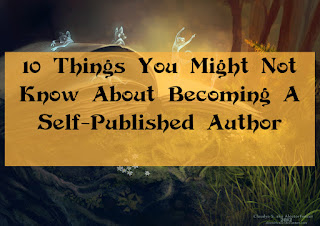Starting Out as a Writer - 5 Things You Need to Know
When I started out as a writer in 1994, I was too young to care what I was getting myself into. Probably a lot of you are the same way. I'm not sure how many people hit their 20s, 30s, or 40s and suddenly think "hmmm, I think I'll be a writer." There may be some. For this post, though, I'm going to hand out some advice for people who are starting out calling themselves writers -- who are starting to take that title more seriously, and what they can expect along the way.
First, and most important thing to know when you start calling yourself a writer, is that you will not always feel like one. Especially in the beginning, you may have dry spells - hours, days, weeks, months. Two separate times I went an entire year without writing. And you hear the adage: "writers write" and think, is the inverse true? Are people who don't write, not writers? Here's the thing: if you spend any time even thinking about your story, you're writing even if nothing is making it onto the page.
Second, courtesy of Brandon Sanderson: this doesn't need to become a full-time job. If that's your dream, pursue it, and fie upon the naysayers. But people can have this strange reaction that writing is only worthwhile if it's going to be a career - and yet, as Sanderson talks about in his BYU lectures, no one finishes a pick-up game of basketball and asks everyone: "so, when are you going pro?" Don't fall into that trap: write because you enjoy it.
Third: Most people you meet will "have thought about writing a book, once." If they seem serious, encourage them; if they say it and let it go, it's not necessarily because they had their dreams crushed. A lot more people are enamored with writers than possess what they need to actually become one, and that's okay.
Fourth: A friend and mentor once said to me: "You can be the artist and starve; or you can have a real job and make a comfortable living." This is the most prevalent attitude toward writers. Accept it with a smile, and do whatever you want. Me? I'd rather "starve" (he and I probably have different definitions on that word) doing what I love, then be comfortable doing something I think makes no difference in the world. (That said, my writing income is not even up to "starving" level, so I do have a day job. More on that in a future post.)
Fifth: You need to join a writing community. Twitter has been best for me. The writers and authors I follow and who follow me are the most encouraging group of individuals I have ever come across. They will share in your struggles and your accomplishments, they will challenge you and support you. And if you're going to call yourself a writer, you're going to need it -- and you're going to be able to offer something right back, something they need.
Now stop reading, and get to writing, you writer!
First, and most important thing to know when you start calling yourself a writer, is that you will not always feel like one. Especially in the beginning, you may have dry spells - hours, days, weeks, months. Two separate times I went an entire year without writing. And you hear the adage: "writers write" and think, is the inverse true? Are people who don't write, not writers? Here's the thing: if you spend any time even thinking about your story, you're writing even if nothing is making it onto the page.
Second, courtesy of Brandon Sanderson: this doesn't need to become a full-time job. If that's your dream, pursue it, and fie upon the naysayers. But people can have this strange reaction that writing is only worthwhile if it's going to be a career - and yet, as Sanderson talks about in his BYU lectures, no one finishes a pick-up game of basketball and asks everyone: "so, when are you going pro?" Don't fall into that trap: write because you enjoy it.
Third: Most people you meet will "have thought about writing a book, once." If they seem serious, encourage them; if they say it and let it go, it's not necessarily because they had their dreams crushed. A lot more people are enamored with writers than possess what they need to actually become one, and that's okay.
Fourth: A friend and mentor once said to me: "You can be the artist and starve; or you can have a real job and make a comfortable living." This is the most prevalent attitude toward writers. Accept it with a smile, and do whatever you want. Me? I'd rather "starve" (he and I probably have different definitions on that word) doing what I love, then be comfortable doing something I think makes no difference in the world. (That said, my writing income is not even up to "starving" level, so I do have a day job. More on that in a future post.)
Fifth: You need to join a writing community. Twitter has been best for me. The writers and authors I follow and who follow me are the most encouraging group of individuals I have ever come across. They will share in your struggles and your accomplishments, they will challenge you and support you. And if you're going to call yourself a writer, you're going to need it -- and you're going to be able to offer something right back, something they need.
Now stop reading, and get to writing, you writer!



Comments
Post a Comment